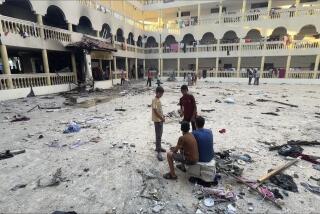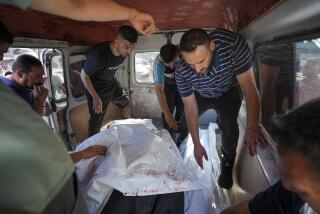Drone attack kills 6 at Pakistan seminary
- Share via
PESHAWAR, Pakistan -- A suspected U.S. drone attack early Thursday on a religious seminary believed to be linked to the ruthless Haqqani insurgent network killed at least six people and wounded eight, according to police and witnesses.
Residents of Khyber Pakhtunkhwa province said the drone fired four missiles at the hard-line Taleem-ul-Quran seminary in the garrison town of Thall at around 7 a.m. local time, destroying two of the institution’s mud-built walls. The seminary is run by Qari Noor Ullah, a religious leader affiliated with the Haqqani group, and is located near a major Pakistan army garrison.
It was not immediately clear who the target was and whether he or they were hit. News reports, citing unnamed security officials, said the dead included Mufti Ahmad Jan and Mufti Hameedullah, both members of the Haqqani network. The seminary is in a northwest area populated by Afghan refugees who account for the vast majority of its 150 students, locals said.
U.S. drone strikes are controversial in Pakistan, and this was one of the rare attacks to take place in “settled Pakistan” since the program started in 2004. Most take place in the nation’s largely lawless tribal areas. During a meeting in Washington in October, Prime Minister Nawaz Sharif urged President Obama to end the strikes.
“The latest drone strike is a clear indication that America will not hesitate to carry out such attacks in Islamabad, Lahore or Peshawar,” said provincial information secretary Israrullah Khan Advocate, a member of the Jamaat-e-Islami party in the ruling coalition.
Many Pakistanis believe that drone attacks kill an unacceptable number of innocent civilians and are an insult to the nation’s pride and sovereignty. But analysts say parts of the Pakistani government have quietly supported the CIA-led program, providing targeting and other key intelligence, even as they decry it in public.
Hassan Rahman, a Thall resident, said by phone that several people he didn’t recognize retrieved six bodies and assisted eight wounded people from the debris. Little is known locally about Noor Ullah, he added, although he heard from local intelligence officials that Noor Ullah is affiliated with Gul Bahadur, a senior Taliban commander from neighboring North Waziristan who is closely linked with the Haqqani group.
“The bodies and wounded people were put in ambulances and moved to an unknown location,” he said, adding that neither police nor local residents were allowed to take part in the rescue work.
Several drones were flying over Thall and adjacent tribal areas for the past four days, apparently hunting for something in particular, residents said. The latest drone strike comes as the provincial ruling party, Pakistan Tehreek-e-Insaf, has pledged to block trucks passing through Khyber Pakhtunkhwa with NATO supplies bound for Afghanistan.
Party leader and former cricket star Imran Khan has accused the U.S. government of sabotaging peace talks with the Taliban by carrying out drone strikes in Pakistan’s tribal areas.
Thursday’s attack comes three weeks after Pakistani Taliban leader Hakimullah Mehsud died in a drone attack. The U.S. has called on Pakistan repeatedly to crack down on the Haqqani network, among the most feared militants in Afghanistan and which is blamed for a 2011 attack on the American Embassy in Kabul.
On Wednesday, Pakistan said it had received assurance from Washington that the U.S. would not carry out drone strikes against Taliban members when Islamabad was trying to engage the militants in peace talks. The extent and timing of the agreement was not immediately clear.
Pakistani officials were angry over the North Waziristan attack that killed Mehsud, claiming that it came a day before they planned to invite him to hold peace talks.
Also Thursday, a bombing in Pakistan’s restive southwest reportedly killed three people, including two policemen, and wounded 25. News reports said the remote-controlled device was planted on a bicycle near a police and paramilitary checkpoint on the outskirts of Quetta, the capital of Baluchistan province.
There were no immediate claims of responsibility, but Baluchistan is the site of sectarian violence and a decade-long insurgency seeking greater autonomy from Islamabad.
Most drone strikes in Pakistan have taken place in North Waziristan, the Haqqani network’s base in Pakistan. Washington has repeatedly urged Pakistan to carry out a military campaign in North Waziristan, but Islamabad has balked, arguing that the army is already pressed fighting militants elsewhere.
But some analysts say Pakistan may want to exploit the Haqqani network after foreign combat troops leave Afghanistan in late 2014 as a way to extend its influence over its troubled neighbor.
ALSO:
Afghans release draft of security accord with U.S.
Iran won’t back down in nuclear talks, supreme leader vows
European lawmakers challenge France to end ‘traveling circus’
Twitter: @markmagnier
Special correspondent Ali reported from Peshawar and Times staff writer Magnier from New Delhi.
More to Read
Sign up for Essential California
The most important California stories and recommendations in your inbox every morning.
You may occasionally receive promotional content from the Los Angeles Times.










